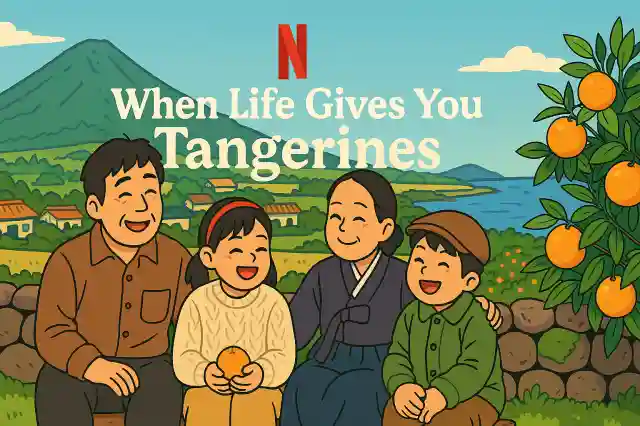When Life Gives You Tangerines: A Sweeping Korean Drama
Capturing Hearts in 2025 with a Multi-Generational Tale
“When Life Gives You Tangerines” has emerged as one of 2025’s most captivating K-dramas, weaving a multi-generational tale set against the stunning backdrop of Jeju Island. This emotionally rich series follows the lives of Ae-sun and Gwan-sik as they navigate life’s complexities across six decades, creating a narrative that resonates deeply with viewers worldwide.
Key Takeaways
- The drama explores the true meaning of family beyond blood relations.
- It chronicles Korea’s transformation through pivotal historical periods.
- The series subverts conventional K-drama formulas, offering a nuanced viewing experience.
- The story is set against the breathtaking backdrop of Jeju Island, showcasing its unique culture.
Table of Contents
- When Life Gives You Tangerines: A Sweeping Korean Drama
- A Story of Family, Resilience, and Time
- Historical Context and Cultural Significance
- Character Depth and Emotional Resonance
- Visual Storytelling and Production Quality
- Why “When Life Gives You Tangerines” Resonates with Viewers
- The Cultural Impact
- Conclusion
A Story of Family, Resilience, and Time
“When Life Gives You Tangerines” distinguishes itself through its thoughtful exploration of what truly constitutes family. The narrative begins in the post-war 1950s on Jeju Island, following young Ae-sun who becomes an orphan at just ten years old after losing her haenyeo (female diver) mother. This tragic beginning sets the stage for a profound examination of chosen family versus blood relations.
The Meaning of True Family
The series poignantly illustrates how Ae-sun navigates life between two households—her paternal uncle’s home and her stepfather’s residence—where she’s consistently treated as an outsider despite blood and marriage connections. In both homes, she experiences neglect and broken promises, highlighting the painful reality that biological ties don’t always translate to genuine care.
What makes this storyline particularly moving is the contrast between these disappointing family relationships and the unconditional love Ae-sun receives from unexpected sources: her mother’s haenyeo friends and Gwan-sik. These connections, formed through compassion rather than obligation, demonstrate the drama’s central theme that true family is defined by love and actions, not merely by blood.
A Multi-Generational Journey
The narrative expands beyond Ae-sun and Gwan-sik to include their daughter, Geum-myeong, whose life choices reflect both her parents’ influence and her own determination to forge her path. Her romantic journey subverts typical K-drama tropes, showing how she prioritizes her family’s dignity over her own happiness when faced with class discrimination from her first love’s mother.
This generational storytelling approach allows viewers to witness how patterns repeat, evolve, or break across decades, creating a rich tapestry of interconnected lives that spans from the 1950s through the early 21st century.
Historical Context and Cultural Significance
“When Life Gives You Tangerines” does more than tell a family story—it chronicles Korea’s transformation through pivotal historical periods. Set initially in post-war Jeju Island, the drama provides glimpses into rural Korean life during a time of recovery and rebuilding.
Jeju Island’s Unique Culture
The drama showcases Jeju’s distinctive cultural elements, particularly through Ae-sun’s mother, who worked as a haenyeo—one of the island’s famous female divers who harvest seafood without modern equipment. This representation honors a tradition now recognized by UNESCO as an Intangible Cultural Heritage, adding educational value to the series.
For more information on Jeju Island’s culture, visit Darakroom’s K-Drama New Releases.
Modernization Through Personal Stories
As the narrative progresses through the decades, viewers witness Korea’s rapid modernization reflected in the characters’ changing circumstances. From rural farming communities to university life in Seoul and artistic pursuits, the drama illustrates how economic and social transformations affected ordinary Koreans across generations.
Character Depth and Emotional Resonance
What truly sets “When Life Gives You Tangerines” apart is its nuanced character development and emotional authenticity. Each character faces difficult choices that reveal their values, weaknesses, and capacity for growth.
Ae-sun’s Journey
Ae-sun’s character arc from orphaned child to matriarch demonstrates remarkable resilience. Despite being treated as an outsider by her extended family, she maintains her dignity and eventually builds her own loving home. A particularly moving storyline involves her decision regarding the family house—a property with deep emotional significance as her connection to her deceased mother.
Geum-myeong’s Romantic Choices
The second-generation storyline featuring Geum-myeong offers a refreshing take on romance in K-dramas. Rather than adhering to the “one true love” trope, the series shows her making the difficult decision to end her seven-year relationship with Park Yeong-bum when his mother’s classist attitudes hurt her parents. This sacrifice demonstrates both filial piety and self-respect, values that resonate throughout the series.
For more insights on K-drama romance, check out Resident Playbook K-Drama Review.
Visual Storytelling and Production Quality
The drama’s setting on Jeju Island provides not only narrative significance but also visual splendor. The “breathtaking backdrop” mentioned in reviews suggests that the production team has effectively captured the island’s natural beauty, from its volcanic landscapes to its coastal vistas.
The period settings across different decades would require meticulous attention to detail in costumes, props, and set design. This commitment to historical accuracy enhances the immersive quality of the storytelling, allowing viewers to feel transported through time alongside the characters.
Why “When Life Gives You Tangerines” Resonates with Viewers
The universal themes explored in this drama explain its broad appeal. While firmly rooted in Korean culture and history, the series addresses experiences common to people everywhere: the search for belonging, the complexity of family relationships, the pain of social discrimination, and the enduring power of love across generations.
Subverting Expectations
By challenging conventional K-drama formulas, particularly in its approach to romance and family dynamics, “When Life Gives You Tangerines” offers a more mature and nuanced viewing experience. The title itself suggests a philosophy of making the best of life’s circumstances—a theme embodied by characters who face hardship with dignity and find sweetness even in bitter situations.
Emotional Authenticity
The series doesn’t shy away from depicting the harsh realities faced by its characters, from Ae-sun’s childhood neglect to Geum-myeong’s heartbreaking decision to end her engagement. This emotional honesty creates a profound connection with viewers who appreciate stories that acknowledge life’s difficulties while still offering moments of joy and hope.
The Cultural Impact
As “When Life Gives You Tangerines” continues to gain international attention, it joins the ranks of Korean dramas that have successfully crossed cultural boundaries. Its focus on family relationships rather than just romantic entanglements broadens its appeal to viewers of all ages and backgrounds.
The drama also serves as a cultural ambassador, introducing international audiences to aspects of Korean history and traditions they might otherwise never encounter. From the haenyeo diving culture of Jeju to the social changes that accompanied Korea’s economic development, these elements provide context that enriches the viewing experience.
For those new to K-dramas, “When Life Gives You Tangerines” offers an excellent entry point—a story with universal emotional appeal told through a distinctly Korean lens. For seasoned K-drama enthusiasts, it represents the genre at its best: thoughtful, beautifully crafted, and emotionally resonant.
Watch “When Life Gives You Tangerines” on Netflix.
Conclusion
“When Life Gives You Tangerines” stands as a testament to the power of storytelling that spans generations and transcends cultural boundaries. Through its careful attention to historical detail, nuanced character development, and exploration of timeless themes, this 2025 K-drama has earned its place as a memorable addition to the genre.
As viewers follow Ae-sun and Gwan-sik’s journey across six decades, they’re invited to reflect on their own family histories and the ways in which past choices shape present realities. In showing how true family can be found beyond blood relations and how love can flourish despite societal obstacles, the series offers both comfort and challenge to its audience.
With its breathtaking setting, compelling characters, and emotional depth, “When Life Gives You Tangerines” reminds us that the most meaningful stories are often those that acknowledge life’s bitterness while still celebrating its sweetness—much like the tangerines that give the drama its evocative title.


